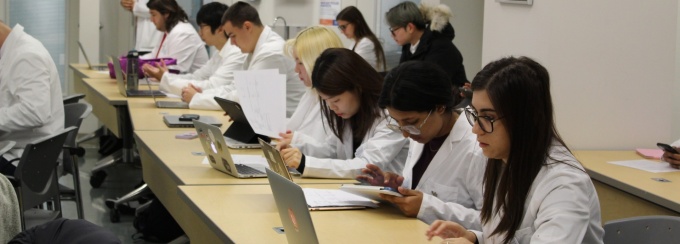Curricular Collaboration and Enrichment
Explore co-curriculum activities that will enhance your coursework and career development.

On This Page:
Co-curriculum Activities
The co-curriculum is a set of activities and assignments meant to complement the learning experiences of the PharmD courses (didactic and experiential). The co-curriculum is designed to help you develop into an effective and well-rounded pharmacist. Refer to the Personal and Professional Development Handbook on UBLearns for details.
Coursework and Electives
As part of the PharmD curriculum, you will learn basic fundamentals of professionalism, individual development, and pharmacy practice. Our Pharmacy Professional Development and Leadership courses are a sequence of courses that span the P1-P3 didactic curriculum with the goal of introducing professionalism, professional identity and leadership concepts. Topics include networking and interviewing, professional organizations, critical thinking and problem solving, effective communication, strategies for pharmacy school and more.
Elective courses provide opportunities to enhance your knowledge, skills and professional attitude beyond what’s provided by the core curriculum. Your advisor can guide you toward electives that compliment your career path.
Experiential Education
The Introductory Pharmacy Practice Experiences (IPPE) sequence takes place during your second (P2) and third (P3) years. It provides the opportunity to observe and practice a variety of professional activities in multiple settings, including inpatient and community pharmacy.
The Advanced Pharmacy Practice Experiences (APPE) sequence takes place during your fourth (P4) year. You will provide advanced clinical pharmacy services in various healthcare environments to build on your previous academic experience.
Interprofessional Education
Interprofessional Education (IPE) prepares UB health professions students to work in a collaborative team environment to provide highly effective care.
Dual and Collaborative Degrees
Dual and collaborative degree programs combine multiple interests into one degree, allowing you to save time and money versus earning separate degrees. These unique qualifications also allow you to distinguish yourself from your peers and enhance your career opportunities.
Micro-credentials
Micro-credential programs provide specialized knowledge in research, teaching, and professional development beyond what’s included in the core curriculum, preparing you for postgraduate training. Highlighted programs include: Scholars Program, Clinical Research Program (CRP), and Global Health.